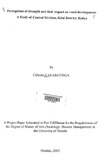| dc.description.abstract | The research on which this project paper was based meant to study the local perceptions of
drought and their impact on rural development in Central Division, Kitui District, Kenya.
These perceptions of drought were assessed in the light of socio-economic and demographic
factors. The ways through which local communities respond to drought as disaster were
identified and the impact of the drought perceptions analyzed.
To capture the local perceptions, this study employs the theoretical models of
Symbolic Interactionism, Social Conflict, and Disaster Management due to their presentation
of reality as it is constructed by the actors. The data for the study were collected using the
survey methods of semi-structured interviews, key Informant interviews and review of
secor..dary data. The interview was the main technique of data gathering. A total of 80
- households were interviewed. Of these, 44 (55%) were headed by men and 36 (45%) by
women. Sampling was done using Simple Random Sampling technique. Both descriptive and
inferential statistics were used in data analysis.
Majority of the respondents (67.50%) were aware of drought and 56.25%
perceived the frequency of the drought occurrence to be once in every 3 or 4 years. Drought
and hunger were not inseparable concepts. Thus, drought was taken as hunger or famine. The
study found three categories of perceived causes of drought and the main factors contributing
to this categorization were the level of education and religion. The awareness of drought was
found associated with frequency of drought occurrence, experience with drought and
respondents' monthly income. Pro-active and reactive actions were identified as responses to
drought and while all the pro-active responses were associated with the experience with
drought none of the reactive responses to drought was found to be related to the experience
with drought. --
The study shows an enhanced awareness of the need for more concerted
drought management and preparedness measures. Increase in the drought hazard is attributed
to the increased frequency and severity of drought as well as an increased societal
vulnerability to drought and somehow a combination of the two.
The study concludes that the drought impact IS a function of people's
vulnerability. Although these people cannot do away with drought as a natural hazard, a lot of
sensitization must be done about eliminating those they cause, minimizing those they
exacerbate, and reducing their vulnerability to most. Accordingly, three recommendations
were formulated.
First, in order to facilitate further research towards drought risk reduction, the
study recommends comparative studies of the perceptions of drought to be conducted in other
drought prone areas and more detail studies of women's and men's contribution to drought
risk reduction to strengthen the gender angle in understanding and dealing with drought.
Secondly, training end users about the value of the information from early
warning system in decision making was recommended for drought management policy with
promotion of and support to pro-active measures. A vulnerability profile should be seen as an
invaluable tool in assessing risk and should be taken as part of drought preparedness
planning.
Finally, the study recommends to local communities, to organize themselves
.,
to solve their water problems and thus fight poverty resulting from the local perceptions of
drought. For as long these communities continue to believe that the responsibility of tackling
this poverty lies in the hands of the government, poverty levels among them will remain
high. An integrated local development approach based on community-driven priorities and
processes should guide the change agenda in Kitui and other ASALs . | en |

